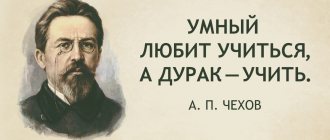Wiktionary has an entry for "aphorism"
Maxim's request is redirected here; see also other meanings.
| : Incorrect or missing image | This article lacks links to sources of information. Information must be verifiable, otherwise it may be questioned and deleted. You may edit this article to include links to authoritative sources. This mark is set May 20, 2021 . |
K:Wikipedia:Articles without sources (type: not specified)
Aphorism
(from ancient Greek ἀφορισμός “definition”) - an original complete thought, expressed and written down in a laconic, memorable text form and subsequently repeatedly reproduced by other people.
In an aphorism, the utmost concentration of the immediate message and the context in which the thought is perceived by the surrounding listeners or reader is achieved.
Examples of aphorisms
The expressiveness of an aphorism increases as the number of words decreases; about 3/4 of all aphorisms consist of 3-5 words. Aphorisms are born both in the context of scientific, philosophical, artistic works, and independently:
- “Mediocrity is easier to forgive a person than talent” (Emil Krotky);
- “Both brawlers are stupid” (I. A. Krylov);
- “Everyone hears only what he understands” (Johann Wolfgang Goethe);
- “Knowledge is power” (Francis Bacon) (lat. “scientia est potentia”
, by the way, in the original[1] it sounded like this: lat.
“Scientia et potentia humana in idem coincidunt”
(“Knowledge and human power coincide”), which demonstrates the transformation of the original author's statement into the form of an aphorism and the subsequent, erroneous, identification of them). - “You have to study a lot to realize that you know little” (Michel de Montaigne);
- “There is nothing more stupid than the desire to always be smarter than everyone else” (Francois de La Rochefoucauld);
- “Life is beautiful if you learn to live” (Menander)
The statement of L. Vauvenargues “Express a false thought clearly, and it will refute itself” best characterizes one of the features of the aphorism genre.
Thoughts of the greats
Famous poets, writers and thinkers are also the authors of many popular expressions and aphorisms. The well-known Anton Pavlovich Chekhov said a phrase that every person has definitely said at least once in his life: “Brevity is the sister of talent.” Three simple words, but how much meaning they contain! And everything is clear - there’s no need to even think about anything here. This phrase confirms another aphorism of Anton Pavlovich. He said that one should be wary of refined language.
Another great Russian poet, Sergei Yesenin, was a master of beautiful expressions. He said one good phrase: “Whoever loved cannot love; whoever is burned cannot be set on fire.” Yesenin knew how to correctly select comparisons and use them in his speech. This is exactly how many of his statements were born, which became catchphrases.
Despite the fact that Sergei Alexandrovich was very young, he spoke words that awakened certain thoughts in a person. “You need to live easier, you need to live more simply, accepting everything that is in the world” - this is also his expression. Few people quote it verbatim, but this phrase is vital for everyone. Every person understands what Sergei Alexandrovich wanted to say.
Recognized authors of aphorisms
- Sakya Pandita was a medieval Tibetan scholar and writer from the 13th century. The poetic aphorisms from his “Precious Treasury of Edifying Sayings” were extremely popular in Tibet and Mongolia, and many of them became popular proverbs.[2]
- Shota Rustaveli - Georgian statesman and poet of the 12th century, author of the textbook epic poem “The Knight in the Skin of a Tiger”
- Juan Manuel was a medieval Spanish writer from the 14th century. The second, third and fourth parts of his famous book “Count Lucanor” (1335) are a collection of aphorisms and sayings.
- Francois VI de La Rochefoucauld - the result of La Rochefoucauld's extensive life experience was his “Maxims” [3] (Maximes) - a collection of aphorisms that make up an integral code of everyday philosophy. “Maxim” has a very high and purely literary meaning.
- At the end of the 19th and 20th centuries, famous aphorists were Oscar Wilde, Friedrich Nietzsche, George Bernard Shaw, Stanislaw Jerzy Lec, Karl Kraus, Mikhail Turovsky, Emil Michel Cioran, Edmond Jabez, Malcolm de Chazal, Andrzej Majewski, Alexander Woolcott, Faina Ranevskaya.
Vivid examples
Speaking about what an aphorism is, one cannot do without vivid examples. Perhaps one of the most extravagant personalities, who has truly interesting and original statements, is Faina Ranevskaya. This is an incredible woman who said amazing things, often without shying away from strong words. It is not for nothing that her aphorisms and sayings are so popular; a few years ago a book was even published with her most “sharp” expressions. Well, we should give some examples of them.
“If a patient really wants to live, doctors are powerless,” “Optimism is a lack of information” - Faina Ranevskaya could please people with both funny statements and phrases that made them think and even rethink something. Her aphorisms about life are especially good because she said what she thought. This quality has always been rare, and that is why it is so valuable.
Literature
Collections of aphorisms
- Babkin A. M., Shendetsov V. V.
Dictionary of foreign expressions and words. A.J. M.: Nauka, 1981. - Babkin A. M., Shendetsov V. V.
Dictionary of foreign expressions and words. KZ. M.: Nauka, 1987.
Literature about aphorisms
- Uspensky L.
Briefly about aphorisms, in the collection: Aphorisms, comp. E. S. Rize, Leningrad, 1964; - Asemissen HU
Notizen uber den Aphorismus, “Trivium”, [Zurich], 1949, no. 2. - Geary J. The world in a phrase: a brief history of the aphorism. New York: Bloomsbury, 2005
- V.V. [Veshnev V.]
Aphorism // Literary Encyclopedia: In 11 volumes - [M.], 1929-1939. T. 1. - [M.]: Publishing House Com. Academician, 1930. - Stb. 279-280. - Tumanova E. O.
Aphorism in phraseology and phraseological units in the aphorism of the modern German language: linguocultural aspect: diss. Candidate of Philological Sciences: 02.10.04 / Moscow. ped. state univ. - Moscow, 2012. - 293 p. - Nefedova L. A.
Precedent texts of modern German aphorisms (based on the book of notes and aphorisms by Elmar Schenkel / Nefedova L. A. // Philological Sciences. - 2005. - N 4 - P. 84 - 93 - Korolkova A.V.
Russian aphorism in the context of phraseology: abstract of thesis. ... Doctor of Philological Sciences: 02.10.01 / Yelets. state University named after I. A. Bunina. - Elets, 2006. - 34 p. - Onipenko N.K.
Grammar of popular expressions / N.K. Onipenko, E.N. Nikitina // Russian literature. - 2006. - No. 4. - P. 56-63 - Kulishkina O. N.
Russian aphorism of the 19th - early 20th centuries: evolution and spheres of influence of the genre: abstract of thesis. ... Doctor of Philological Sciences: 01/10/01 / St. Petersburg. state univ. - St. Petersburg, 2004. - 41 p. - Rekhlova O. A.
Aphorisms in the newspaper / O. A. Rekhlova // Russian speech. — 2007. — No. 3. — P. 62-68 - Zemlyanskaya E.V.
Structural-semantic and functional features of stylistic intertextuality in an English-language aphorism: abstract of thesis. ... Candidate of Philological Sciences: 02.10.04 / St. Petersburg. state univ. - St. Petersburg, 2004. - 18 p. - Vaganova E. Yu.
Aphorism as a type of text in the aspect of intertextuality: Based on the material of the German language: dissertation ... candidate of philological sciences: 10.02.04. - Kaliningrad, 2002. - 261 p. - Shumakova A.P.
French aphorism as a text: dissertation ... candidate of philological sciences: 10.02.05. - Smolensk, 2006. - 241 p. - Helge Hesse
History in aphorisms. M., Text, 2009.
Comparison
Many people have heard newscasters quote the original source, always adding an “end quote” at the end. Announcers act in accordance with laws that are a development of the legal norm established by the Civil Code of the RSFSR of 1964. After the collapse of the Soviet Union, the use of quotes is regulated (or was previously regulated) by the following legislative acts:
- Law No. 535-1 “On Copyright and Related Rights” of 1993;
- Civil Code of the Russian Federation (Part 4, Article 1274);
- amendments to the Civil Code of the Russian Federation introduced by Federal Law No. 35-FZ of March 12, 2014.
Quoting is necessary, first of all, to refer to the original source and to give your speech more weight. The aphorism, unlike its older “sister” quotation, is more “frivolous”, and its task is somewhat different. An aphorism is used to add brightness, imagery, and expression to speech. It makes no claims to accuracy, and its authorship is often impossible to identify. And one more, main difference: a quotation can be any statement, even if it is false, clumsily stated or too long, but an aphorism is simple, short and vivid. The essence of the aphorisms is expressed by the following aphorism: simple does not mean primitive.
Excerpt characterizing the Aphorism
Davout looked at him silently, and some excitement and embarrassment expressed on Balashev’s face apparently gave him pleasure. “You will be given your due,” he said and, putting the envelope in his pocket, he left the barn. A minute later, the Marshal's adjutant, Mr. de Castres, entered and led Balashev into the room prepared for him. Balashev dined that day with the marshal in the same barn, on the same board on barrels. The next day, Davout left early in the morning and, inviting Balashev to his place, impressively told him that he asked him to stay here, move along with the luggage if they had orders to do so, and not talk to anyone except Mister de Castro. After four days of solitude, boredom, a sense of subordination and insignificance, especially palpable after the environment of power in which he had so recently found himself, after several marches along with the marshal’s luggage, with the French troops occupying the entire area, Balashev was brought to Vilna, now occupied by the French , to the same outpost where he left four days ago. The next day, the imperial chamberlain, monsieur de Turenne, came to Balashev and conveyed to him the desire of Emperor Napoleon to honor him with an audience. Four days ago, at the house to which Balashev was taken, there were sentries of the Preobrazhensky Regiment, but now there were two French grenadiers in blue uniforms open on their chests and in shaggy hats, a convoy of hussars and lancers and a brilliant retinue of adjutants, pages and generals waiting to leave Napoleon around a riding horse standing at the porch and his Mameluke Rustav. Napoleon received Balashev in the very house in Vilva from which Alexander sent him. Despite Balashev's habit of court solemnity, the luxury and pomp of Emperor Napoleon's court amazed him. Count Turen led him into a large reception room, where many generals, chamberlains and Polish magnates were waiting, many of whom Balashev had seen at the court of the Russian emperor. Duroc said that Emperor Napoleon would receive the Russian general before his walk. After several minutes of waiting, the chamberlain on duty came out into the large reception room and, bowing politely to Balashev, invited him to follow him. Balashev entered a small reception room, from which there was one door to an office, the very office from which the Russian emperor sent him. Balashev stood there for about two minutes, waiting. Hasty steps were heard outside the door. Both halves of the door quickly opened, the chamberlain who opened it stopped respectfully, waiting, everything became quiet, and other, firm, decisive steps sounded from the office: it was Napoleon. He had just finished his riding toilet. He was wearing a blue uniform, open over a white vest that hung down over his round belly, white leggings that hugged the fat thighs of his short legs, and boots. His short hair had obviously just been combed, but one strand of hair hung down over the middle of his wide forehead. His white, plump neck protruded sharply from behind the black collar of his uniform; he smelled of cologne. On his youthful, plump face with a prominent chin there was an expression of gracious and majestic imperial greeting. He walked out, shaking quickly with every step and throwing his head back a little. His entire plump, short figure with wide, thick shoulders and an involuntarily protruding belly and chest had that representative, dignified appearance that forty-year-old people living in the hallway have. In addition, it was clear that he was in the best spirits that day. He nodded his head, responding to Balashev’s low and respectful bow, and, approaching him, immediately began to speak like a man who treasures every minute of his time and does not deign to prepare his speeches, but is confident in what he will always say ok and what needs to be said. - Hello, general! - he said. “I received the letter from Emperor Alexander that you delivered, and I am very glad to see you.” “He looked into Balashev’s face with his big eyes and immediately began to look ahead past him. It was obvious that he was not at all interested in Balashev’s personality. It was clear that only what was happening in his soul was of interest to him. Everything that was outside of him did not matter to him, because everything in the world, as it seemed to him, depended only on his will. “I do not want and did not want war,” he said, “but I was forced into it.” Even now (he said this word with emphasis) I am ready to accept all the explanations that you can give me. - And he clearly and briefly began to state the reasons for his displeasure against the Russian government. Judging by the moderately calm and friendly tone with which the French emperor spoke, Balashev was firmly convinced that he wanted peace and intended to enter into negotiations. - Sire! L'Empereur, mon maitre, [Your Majesty! Emperor, my lord,] - Balashev began a long-prepared speech when Napoleon, having finished his speech, looked questioningly at the Russian ambassador; but the look of the emperor's eyes fixed on him confused him. “You are embarrassed - come to your senses,” Napoleon seemed to say, looking at Balashev’s uniform and sword with a barely noticeable smile. Balashev recovered and began to speak. He said that Emperor Alexander did not consider Kurakin’s demand for passports to be a sufficient reason for war, that Kurakin did so arbitrarily and without the consent of the sovereign, that Emperor Alexander did not want war and that there were no relations with England.
Origin of the term
So, before considering what an aphorism is, I would like to say a few words about the origin of this term. This is a Greek word, translated it means nothing more than “definition”. An aphorism is a complete thought that is distinguished by some originality. The main feature of the genre is its brevity and the fact that such phrases are easy to remember. And they also have deep meaning. What example can you give?
Let’s say the following expression: “Why is it that those you protect with your chest most often strike in the back?” This phrase is really easy to remember, and it also makes you think and develop the idea expressed in the aphorism. For the most part, the latter was achieved due to the interrogative nature of the sentence. Although the stated essence plays a certain important role here.
Table
The table below summarizes the difference between a quotation and an aphorism.
| Quote | Aphorism | |
| Legal status | Clearly expressed, stipulated in laws | Has no legal status |
| Length | Any | Most often, no more than five words, but aphorisms of much longer length are acceptable, however, they are much less common and it is precisely because of the length that they lose their main attractiveness - expressiveness, expressiveness and intelligibility |
| Main Application | Mass media, scientific literature, legal documents; in other areas - much less often | Due to their brevity, clarity and good memorability, they are used in many areas: in literature, the media, everyday speech (it is hardly possible to outline at least an approximate boundary) |
Introduction of the concept into various sciences
In the 8th century, Dante argued that "aphorism" was a medical term. Over time, it began to spread to other industries. It began to appear in the natural sciences, politics, philosophy, and jurisprudence. Tacitus predetermined the transition of aphorism from medicine to the political field. Here he likened the human body to a state body, which required treatment with moral means and drugs. Antonio Perez believed that an aphorism was his political statements about morality. Many researchers believe that they have a literary and artistic form.










